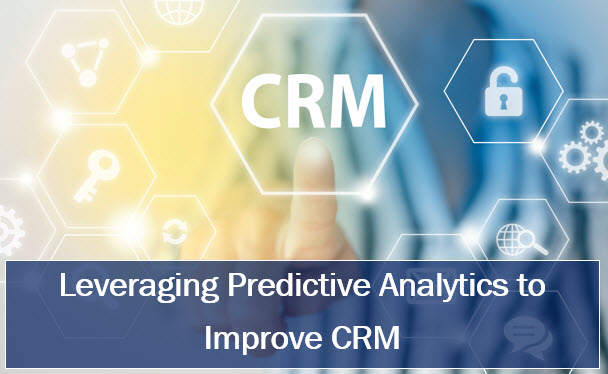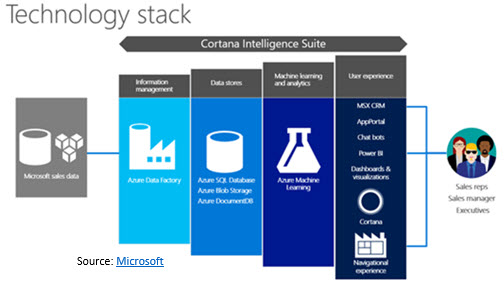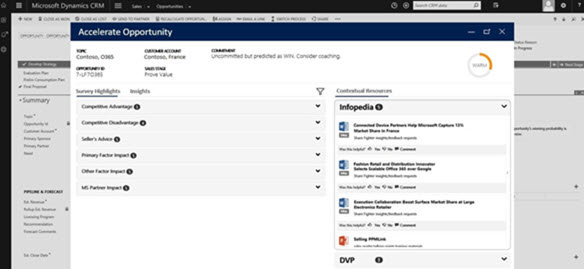May 26, 2020 - by Synoptek
As technology evolves and the world becomes more engaged digitally, you need to know your customers and prospects better than they know themselves. This helps you understand their needs and wants – well before they realize themselves. That’s why you need to embrace predictive analytics to make predictions about future events. CRM predictive analytics looks at information from the entire customer life cycle to predict how customers will behave and how you can connect and engage with them in new and effective ways.
Download our resource, to learn how enterprise data warehouses and BI work together in the age of cloud to improve your business.

While existing customers and potential customers are always waiting to have a need fulfilled, the question is – are you prepared to sell at the right time, in the right place, and using the right channel? How do you make sure each sale happens at the right moment? How do you ascertain each interaction provides a value-added experience?
The Need for CRM Predictive Analytics
Meeting your annual sales targets is critical to the success of your organization. This requires you to accurately forecast your sales revenue in order to make informed decisions and accelerate opportunities. Microsoft Dynamics 365’s predictive analytics models is built on Azure Machine Learning and algorithms such as latent semantic analysis and regression analysis. It helps augment human judgment with seller feedback and ongoing model retraining, which results in analytics-based insights. These analytics capabilities can help your sales executives better plan and prioritize opportunity pipelines and improve forecasting accuracy.
While your sales force is the best judge of whether or not your organization will win a deal or how successfully (or poorly) an opportunity is progressing, there are a host of data-related challenges they face that come in the way of making the right sales decisions. Some of the top challenges include:
- The presence of humongous amounts of customer data – with practically no insights
- No access to valuable data to improve forecasting accuracy
- Absence of predictive capabilities in modern tools that results in disconnected experiences – with reduced productivity and increased inefficiency
- The incompleteness of CRM data in systems that hampers good quality predictions
- Data is tied to monthly and quarterly business tasks, leading to insufficient real-time data
Modernizing sales and marketing capabilities requires you to adopt customized sales solutions that streamline seller tasks; solutions that are built on advanced analytics models that increase the ability of your salespeople to make informed decisions, provide data about each customer opportunity (based on telemetry and visualization), and offer suggestions for specific actions. Access to advanced analytics supplements the decision-making abilities of your sales teams, enabling them to rethink and revamp their judgments. Having a better understanding of the risks in pipelines allows them to adjust schedules and take advantage of hot opportunities.

Improving Sales with CRM Predictive Analytics Tools
With worldwide revenues for big data and business analytics expected to grow to $274.3 billion by 2022, predictive analytics methodologies can help in making use of millions of previous opportunities sellers have worked on over the past couple of years and calculating near real-time opportunity win/loss predictions with sophisticated machine-learning algorithms. By aggregating end-to-end sales information and feeding it into predictive analytics models, sales professionals can receive powerful analytics-based insights and recommendations.

Key Capabilities of CRM Predictive Analytics
CRM predictive analytics can improve sales outcomes by enabling businesses to:
- Get an end-to-end view of the sales processes and more easily drive the desired outcomes
- Enable sales staff (sellers, managers, and executives) to spend more focused time on customer-facing activities
- Get actionable suggestions along with opportunity indicators to drive sales in the right direction
- Leverage historical data to get concrete, analytics-based advice to finalize deals
- Get perspective and anticipate pain points before customers even realize they exist
- See which opportunities are hot, warm, or cold and get recommendations for data-driven actions
- Provide feedback to the tool and help improve recommendations (and value) the tool provides
With Dynamics 365, you can build and attach your own predictive model using Azure Machine Learning. Leverage the sophisticated predictive technology to have your historical data (sales orders) analyzed, while also easily evaluating your sales pipeline for positive outcomes.
Final Thoughts
With predictive analytics, you can take your CRM game to the next level and enjoy unprecedented profits in the long run. So, make the most of predictive analytics tools to better engage with clients, learn more about individual opportunities, and improve sales productivity and customer satisfaction.
To discover how a technology partner can help your business maximize CRM predictive analytics capabilities to meet your specific needs, contact an expert at Synoptek.
